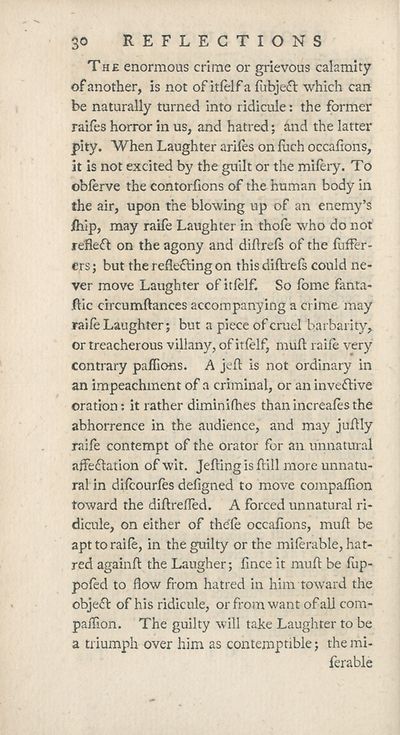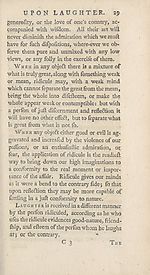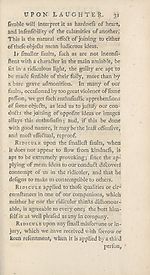Download files
Complete book:
Individual page:
Thumbnail gallery: Grid view | List view

30 REFLECTIONS
The enormous crime or grievous calamity
of another, is not of itfelf a fubjeft which can
be naturally turned into ridicule: the former
raifes horror in us, and hatred; tmd the latter
pity. When Laughter arifes on fiich occafions,
it is not excited by the guilt or the milery. To
obferve the contorfions of the human body in
the air, upon the blowing up of an enemy’s
ftiip, may raife Laughter in thofe who do not
refleft on the agony and diflrefs of the fuffer-
ers; but the refietting on this diftrefs could ne¬
ver move Laughter of itfelf. So fome fanta-
flic circumftances accompanying a crime may
raife Laughter; but a piece of cruel barbarity,
or treacherous villany, of itfelf, mull raife very
contrary paffions. A jefl is not ordinary in
an impeachment of a criminal, or an inveftive
oration: it rather diminifhes than increafes the
abhorrence in the audience, and may juftly
raife contempt of the orator for an unnatural
affeftation of wit. Jelling is flill more unnatu¬
ral in difcourfes defigned to move compaffion
toward the dilire fled. A forced unnatural ri¬
dicule, on either of the'fe occallons, mull be
apt to raife, in the guilty or the miferable, hat¬
red againfl the Laugher; fince it mull be fup-
pofed to flow from hatred in him toward the
objeft of his ridicule, or from want of all com¬
panion. The guilty will take Laughter to be
a triumph over him as contemptible; the mi¬
ferable
The enormous crime or grievous calamity
of another, is not of itfelf a fubjeft which can
be naturally turned into ridicule: the former
raifes horror in us, and hatred; tmd the latter
pity. When Laughter arifes on fiich occafions,
it is not excited by the guilt or the milery. To
obferve the contorfions of the human body in
the air, upon the blowing up of an enemy’s
ftiip, may raife Laughter in thofe who do not
refleft on the agony and diflrefs of the fuffer-
ers; but the refietting on this diftrefs could ne¬
ver move Laughter of itfelf. So fome fanta-
flic circumftances accompanying a crime may
raife Laughter; but a piece of cruel barbarity,
or treacherous villany, of itfelf, mull raife very
contrary paffions. A jefl is not ordinary in
an impeachment of a criminal, or an inveftive
oration: it rather diminifhes than increafes the
abhorrence in the audience, and may juftly
raife contempt of the orator for an unnatural
affeftation of wit. Jelling is flill more unnatu¬
ral in difcourfes defigned to move compaffion
toward the dilire fled. A forced unnatural ri¬
dicule, on either of the'fe occallons, mull be
apt to raife, in the guilty or the miferable, hat¬
red againfl the Laugher; fince it mull be fup-
pofed to flow from hatred in him toward the
objeft of his ridicule, or from want of all com¬
panion. The guilty will take Laughter to be
a triumph over him as contemptible; the mi¬
ferable
Set display mode to:
![]() Universal Viewer |
Universal Viewer | ![]() Mirador |
Large image | Transcription
Mirador |
Large image | Transcription
| Antiquarian books of Scotland > Curiosities & wonders > Reflections upon laughter > (38) |
|---|
| Permanent URL | https://digital.nls.uk/119117948 |
|---|
| Description | Thousands of printed books from the Antiquarian Books of Scotland collection which dates from 1641 to the 1980s. The collection consists of 14,800 books which were published in Scotland or have a Scottish connection, e.g. through the author, printer or owner. Subjects covered include sport, education, diseases, adventure, occupations, Jacobites, politics and religion. Among the 29 languages represented are English, Gaelic, Italian, French, Russian and Swedish. |
|---|

